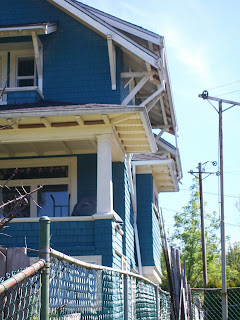This home at 1132 Salsbury is an example of the front gabled Vancouver Craftsman. The style is common in Kitsilano but rarely seen elsewhere in the city.
He didn't mention representative or responsible government during his campaign and Robson soon became discontented with Governor Seymour's refusal to increase the number of elected councillors, interference from the Colonial Office and the persistently heavy civil list. This discontent led Robson to revive his agitation for responsible government. He defined this type of an organization as 'a system by which those officers constituting the government are chosen by the people and are directly responsible to the people from whose pockets the income is derived."
The Thomas Bros. obtained a permit for this $2000 house on August 25, 1909. The house is set 'sideways' (east-west) occupying the north 35 feet of three lots that face onto William Street.
In the Legislative Council, Robson was known as 'the great man on the Westminster side'. However, he was unable to retain New Westminster as the capital. In May of 1868, Victoria was made the capital of British Columbia. New Westminster was suffering a commercial depression and after it lost the standing as capital of the area, it ceased to be a favourable base from which John Robson could 'advocate the broader political questions of the day'.
Early in 1869, he moved the British Columbian newspaper to Victoria. The city though was not big enough to support two papers and the British Columbian published its last issue on July 25 of that year. That wasn't the end of Robson's journalistic career though. A few days after his paper closed, Robson was hired on as editor of the Daily British Colonist and Victoria Chronicle. These papers started in 1866 and were published by David William Higgins, a strong advocate of responsible government and confederation.
Robson predicted, as early as 1862, that the "scattered and detached" British North American colonies must be linked "into one united Federation which should extend from ocean to ocean". One of his main points was that a confederation would break the Colonial office's "yoke of oppression". Robson was also eager to have improved overland communication. He did warn though that British Columbians shouldn't enter the confederation without terms that provided "every fair and legitimate advantage".
In April 1868, at a public meeting in New Westminster, Robson moved a resolution favouring "immediate admission into the Dominion of Canada upon fair and equitable terms". That fall he was one of the representatives from New Westminster at the Yale Convention, which passed resolutions favouring confederation and responsible government. In the same year, he was re-elected to the Legislative Council by acclamation.
The new council decided that "under existing circumstances, the Confederation of the Colony with the Dominion of Canada would be undesirable, even if practicable". Robson formally protested that the Council's decision "did not fairly reflect public opinion".
Once again, I have been referencing the Dictionary of Canadian Biography website.
I hope you find the beauty around you.
Karen Magill, John Robson, history, Premier, Yale Convention British Columbia,David William Higgins,New Westminster,Daily British ColonistRobson predicted, as early as 1862, that the "scattered and detached" British North American colonies must be linked "into one united Federation which should extend from ocean to ocean". One of his main points was that a confederation would break the Colonial office's "yoke of oppression". Robson was also eager to have improved overland communication. He did warn though that British Columbians shouldn't enter the confederation without terms that provided "every fair and legitimate advantage".
In April 1868, at a public meeting in New Westminster, Robson moved a resolution favouring "immediate admission into the Dominion of Canada upon fair and equitable terms". That fall he was one of the representatives from New Westminster at the Yale Convention, which passed resolutions favouring confederation and responsible government. In the same year, he was re-elected to the Legislative Council by acclamation.
The new council decided that "under existing circumstances, the Confederation of the Colony with the Dominion of Canada would be undesirable, even if practicable". Robson formally protested that the Council's decision "did not fairly reflect public opinion".
Once again, I have been referencing the Dictionary of Canadian Biography website.
I hope you find the beauty around you.





















No comments:
Post a Comment